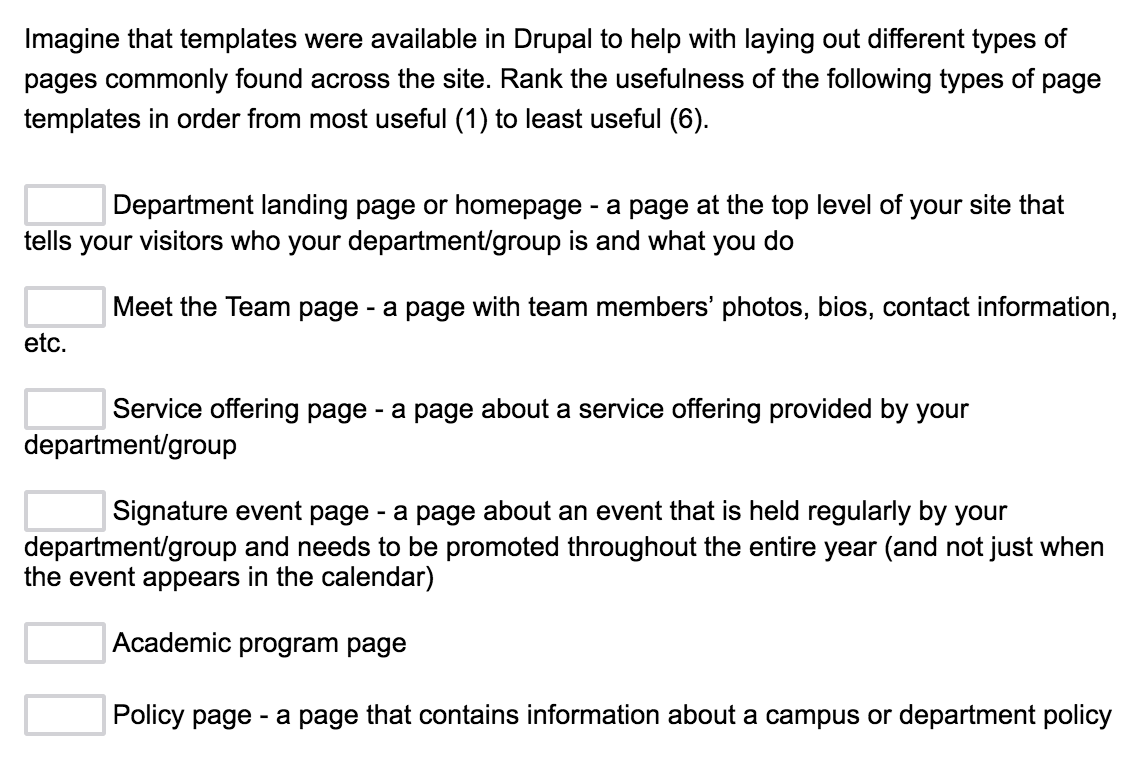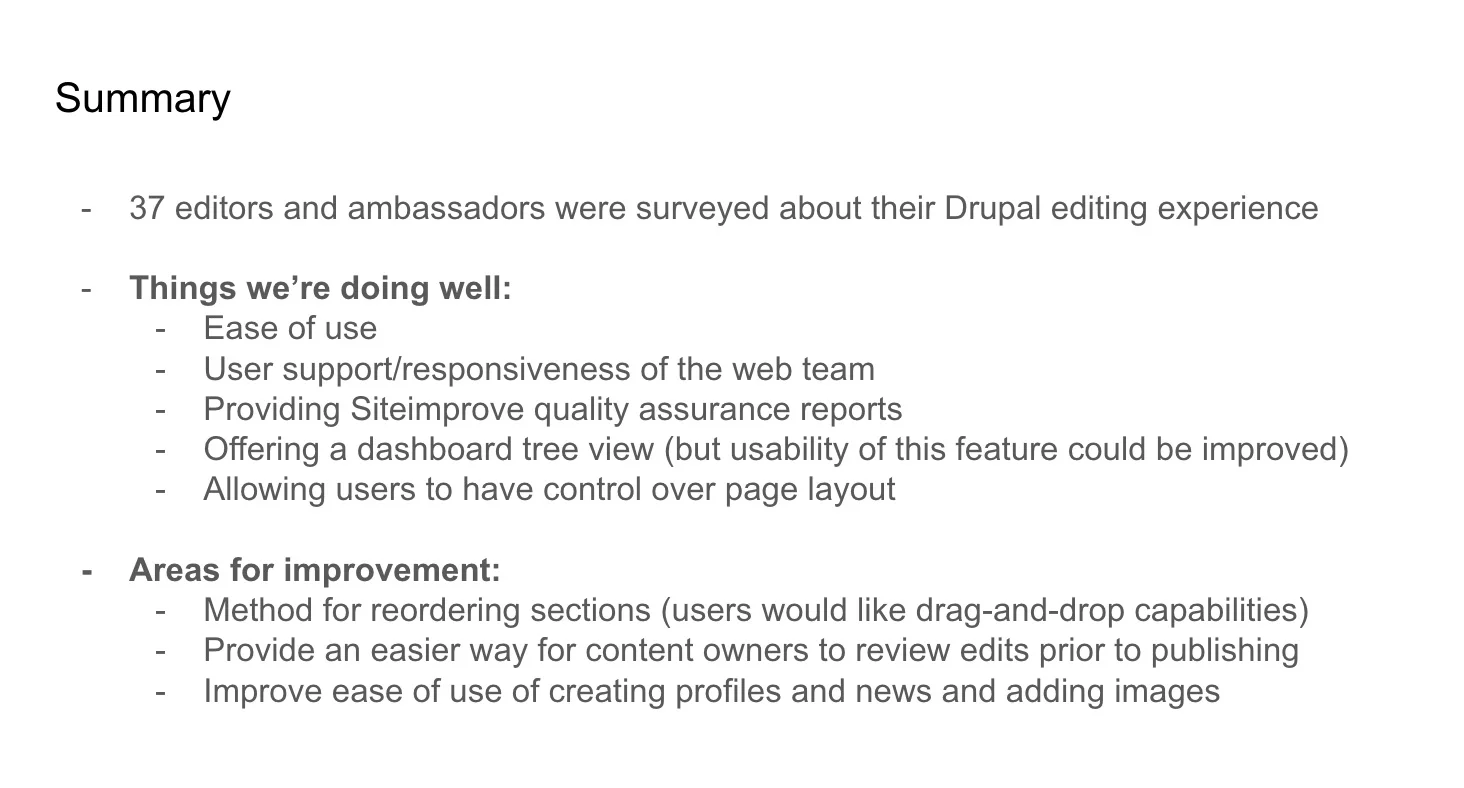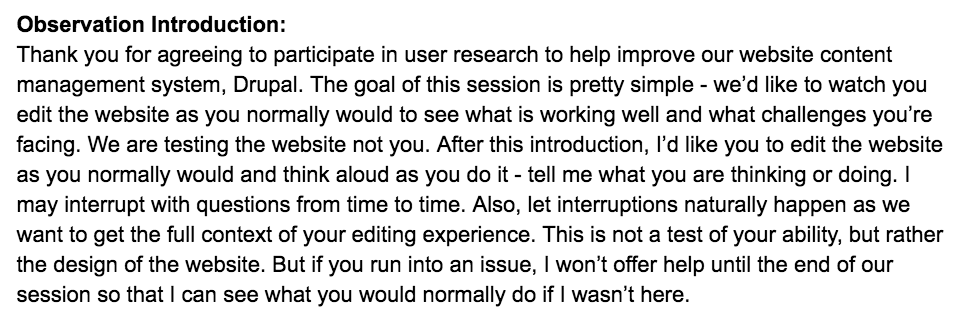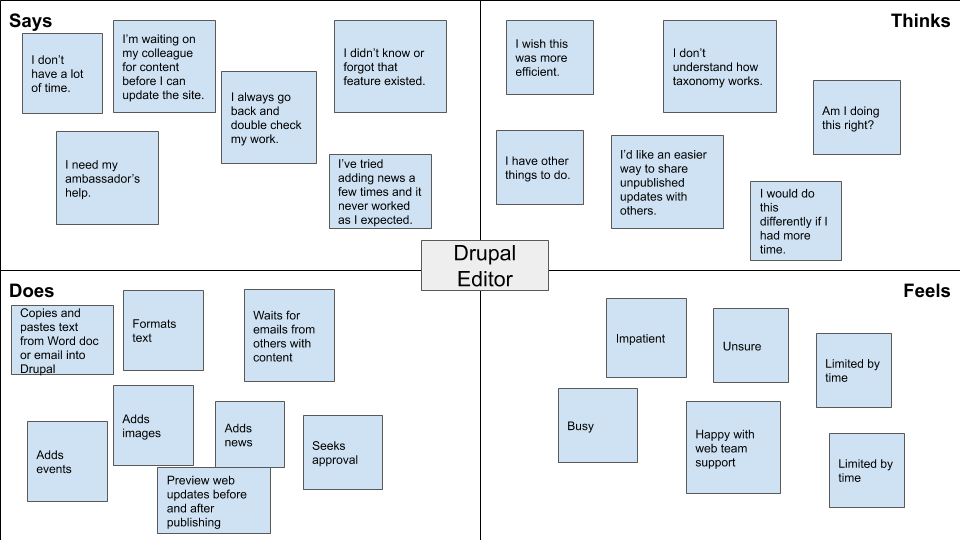PROJECT OVERVIEW: Content Management system (DRUPAL) Editor user Research
Methods and skills: Survey, contextual inquiry
Deliverables: Slideshow presentations
Tools: Qualtrics, Quicktime (for voice recording), Google Slides
Who was involved: Me, UM-Dearborn CMS users, UM-Dearborn web team (web director, Drupal developer and technical project manager)
OPPORTUNITY
The University of Michigan-Dearborn’s web team manages a centralized content management system (CMS) for 100+ users across campus who use it to update their department’s web content. The CMS was built in 2015 on Drupal 7, with plans to upgrade it to a newer version of Drupal (Drupal 8) in the coming year. Because moving to Drupal 8 will involve rebuilding much of the editor interface, we took this as an opportunity to collect feedback from users on which parts of the editing experience are working well for them, what could be improved upon and what they would like to be able to do in Drupal that they can’t currently. This feedback would then be used to help inform the design of the editing interface in Drupal 8.
RESEARCH PROCESS
Survey
In order to collect feedback from as many Drupal users as possible, I sent out an online survey that I built in Qualtrics to our editor user community. I compiled an initial list of questions based on the problem presented to me by the web team director and asked for input from our technical project manager and Drupal developer to determine what type of feedback would be helpful in our design of the editing interface in the upgraded content management system.
Users were asked questions about their current and future use of Drupal, including:
the difficulty level of completing common editor tasks
their likes and dislikes of the system
how much layout control they would like over their pages
the usefulness of some potential page templates
their feelings on the dashboard tree view (a view of pages that shows their relationship to one another)
things they would like to be able to do in Drupal but aren’t currently able to
I analyzed the results using the data analysis tools in Qualtrics and presented my findings in a slideshow to the web team and our vendor partners who will be helping us plan for and build the upgraded content management system.
Excerpt from the survey findings slideshow: Summary slide
Key Finding: Users didn’t want us to reinvent the wheel. They are generally satisfied with their Drupal editing experience and would prefer to see some more minor improvements over a completely redesigned system that they would have to relearn. This finding was particular helpful in guiding the direction of the editor interface proofs of concept created by our web development team, as we initially thought we were in store for a larger redesign effort.
The next phase of our research helped us to narrow in on what some of those improvements should be.
Contextual inquiry sessions
Next, I conducted contextual inquiry sessions with five users during their normal website editing time in their workspaces to better understand their experience using the system. I also wanted to see if there were any discrepancies between what users reported they do in the survey versus what I observed them doing in their natural working environments.
Excerpt from research script
Key Insights:
Although the system offers users design components to add to their pages like buttons, blocks of links, images, videos, news and events, etc., much of the editing work users are doing in Drupal is updating page copy and links through a rich text editor (RTE). A common workflow I observed was users copying text from an email, Word or Google doc and pasting it into the RTE to format it. The RTE was not consistently stripping out text formatting and oftentimes what users saw in the RTE did not match what they saw on the page once their work was saved. This is one area we felt could be significantly improved upon.
I also saw that when editors were adding in images, it was a time-consuming and cumbersome process. This may be one of the reasons users aren’t taking greater advantage of the non-text features in the system. I noted this as another area for future research to dig into further.
Editing is a largely collaborative process and users often check their work and the work of others’ before publishing. Right now, there isn’t an easy way to share an unpublished page with someone who is not a Drupal user themselves, like a supervisor or colleague.
I also noticed a usability issue - our website’s global navigation drop-down menu that appears on hover was often getting in the way of page editing. This reaffirmed a separate plan for reevaluating and likely redesigning our website navigation patterns in the future as well.
View the full results slideshow.
Taking the findings of the survey and contextual inquiry sessions into account, I created an empathy map to better illustrate the comments, thoughts, actions and feelings of our users to the rest of the university web team and our development partners.
Above is an empathy map summarizing the comments, thoughts, feelings and actions of the Drupal editors we observed and surveyed. This can be used as a basis for persona development/refinement in the future.
OUTCOME
The UM-Dearborn web team is still in the process of planning for a migration to Drupal 8 and the rebuild of our editor UI. However, this research helped to refine our plan and prioritize feature development, focusing in on smaller improvements while aiming to maintain the same overall general workflows for content editing. We also plan to test prototypes of the Drupal 8 interface through user acceptance testing as those are developed and do additional user research on some of the more cumbersome parts of the system.
In general, we’ve gotten a lot of positive feedback from website editors about our user research efforts and they are grateful we are asking for their input in this process.
Quotes from editors who participated in user research:
“I truly appreciate your attention to user/editor experiences--paying attention to user experiences is an ideal model that too few groups actually put into practice--thanks!”
“Thanks for asking for feedback!”





